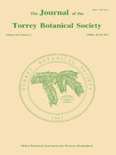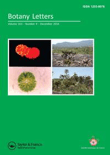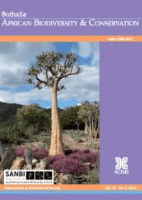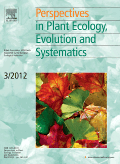
FOLIA GEOBOTANICA
metrics 2024
Pioneering research at the intersection of plants and paleontology.
Introduction
FOLIA GEOBOTANICA, published by Springer, is a distinguished journal dedicated to advancing the fields of Paleontology and Plant Science through the dissemination of high-quality research. With an ISSN of 1211-9520 and an E-ISSN of 1874-9348, this journal has been pivotal in providing a platform for innovative studies from 1994 to 2024. Notably, FOLIA GEOBOTANICA holds a Q3 ranking in Paleontology and a Q2 ranking in Plant Science as of 2023, affirming its relevance and contribution to the scholarly community. The journal is located in the Netherlands at VAN GODEWIJCKSTRAAT 30, 3311 GZ DORDRECHT, and is not an Open Access publication, ensuring comprehensive review processes and scholarly integrity. With Scopus rankings that place it in the 50th percentile for Plant Science and 46th for Paleontology, FOLIA GEOBOTANICA continues to attract researchers, professionals, and students who are keen to explore the intricacies of plant ecology and fossil records, thereby fostering a deeper understanding of ecological and evolutionary patterns.
Metrics 2024
 0.37
0.37 1.00
1.00 1.50
1.50 52
52Metrics History
Rank 2024
Scopus
IF (Web Of Science)
JCI (Web Of Science)
Quartile History
Similar Journals

JOURNAL OF THE TORREY BOTANICAL SOCIETY
Nurturing the future of plant science with every publication.JOURNAL OF THE TORREY BOTANICAL SOCIETY is a prominent academic journal dedicated to advancing the fields of botany and ecology, published by the esteemed TORREY BOTANICAL SOCIETY. With an ISSN of 1095-5674 and an E-ISSN of 1940-0616, this journal serves as a critical platform for researchers, professionals, and students to share their findings and insights. Despite its status in the Q4 category for the 2023 rankings across Ecology, Plant Science, and Ecology, Evolution, Behavior and Systematics, the journal continues to foster significant discourse and collaboration in the botanical sciences, aiming to elevate the understanding of plant biology and ecosystems. Its open access options enhance accessibility, ensuring that groundbreaking research reaches a wider audience. Published in the United States, the journal features work from both established scientists and emerging scholars, making it a vital resource for anyone involved in the study of plants and their environmental interactions. Explore the JOURNAL OF THE TORREY BOTANICAL SOCIETY to engage with cutting-edge research and contribute to the ongoing dialogue in the botanical sciences.

Nature Conservation Research
Connecting researchers and practitioners for a greener tomorrow.Nature Conservation Research is a prominent open-access journal that has been dedicated to advancing the field of conservation science since its inception in 2016. Published by the SARANSK FOND PODDERZKI & RAZVITIA ZAPOVEDNYH in the Russian Federation, this journal serves as a vital platform for researchers, professionals, and students alike, providing critical insights into ecological and environmental issues. With an impressive impact factor and ranked in the second quartile across multiple categories—including Agricultural and Biological Sciences, Earth and Planetary Sciences, Ecology, and Nature and Landscape Conservation—Nature Conservation Research stands at the forefront of impactful scientific discourse. The journal not only aims to disseminate high-quality research findings but also seeks to foster collaboration and innovation in conservation practices globally. By ensuring open access to its content, it promotes widespread dissemination of knowledge, crucial in the fight against biodiversity loss and environmental degradation. Researchers and practitioners contributing to the journal will find themselves at the convergence of science and conservation efforts, paving the way for sustainable ecosystem management.

Botany Letters
Connecting Researchers to Transform Plant ScienceBotany Letters, published by Taylor & Francis Ltd, is a prominent journal in the field of Plant Science based in the United Kingdom. With its ISSN 2381-8107 and E-ISSN 2381-8115, the journal has established itself as an essential resource for researchers, professionals, and students alike, focusing on innovative studies and findings in botany. As a Q2 ranked journal in its category (2023) and holding a respectable Scopus rank of #200 out of 516 in Agricultural and Biological Sciences, it reflects a robust commitment to quality and relevance in the field. The journal's open access model ensures that groundbreaking research is readily accessible, fostering collaboration and knowledge sharing among the global scientific community. Covering a broad spectrum of topics within plant science from 2016, Botany Letters aims to catalyze advancements in the understanding and management of plant biodiversity and sustainability, ultimately contributing to conservation efforts and agricultural innovation.

BOTHALIA
Illuminating the path to sustainable ecosystems.BOTHALIA is a prominent open-access journal dedicated to advancing the fields of Ecology, Evolution, Behavior, and Systematics, as well as Plant Science. Published by the South African National Biodiversity Institute (SANBI), this journal has been disseminating valuable research since 1978 and has embraced open access since 2014 to enhance the visibility and accessibility of scientific knowledge. With an ISSN of 0006-8241 and E-ISSN of 2311-9284, BOTHALIA plays a pivotal role in promoting biodiversity research in South Africa and beyond. In the recent Scopus rankings, it has been positioned at Q4 in both relevant categories, highlighting its contributions within the broader scientific community, despite being in its growing phase amidst competitive rankings. The journal aims to publish high-quality articles that address critical issues in biodiversity and ecological sciences, making it an essential resource for researchers, professionals, and students committed to understanding and managing our planet's biological heritage.

ECOLOGY LETTERS
Exploring the depths of ecological science for a sustainable tomorrow.ECOLOGY LETTERS, published by Wiley, is a premier journal dedicated to advancing the field of ecology and related disciplines. Renowned for its rigorous peer-review process and impactful research contributions, the journal boasts an impressive Scopus Rank of #13 out of 721 in the category of Agricultural and Biological Sciences, positioning it in the 98th percentile globally. With a Q1 rating in the 2023 quartile rankings for Ecology, Evolution, Behavior and Systematics, it serves as an essential platform for ecologists and evolutionary biologists to disseminate cutting-edge research findings from 1998 to 2024. Although not an open-access journal, ECOLOGY LETTERS actively contributes to the global ecology discourse, making it a critical resource for researchers, professionals, and students dedicated to understanding complex ecological interactions and evolutionary processes.

PLANT SPECIES BIOLOGY
Exploring the Intricacies of Plant Species and EcosystemsPLANT SPECIES BIOLOGY, published by WILEY in the United Kingdom, is a prominent journal dedicated to advancing the understanding of plant species, their biology, ecology, and roles within ecosystems. With an impressive convergence of research dating back to 1986 and extending through 2024, this journal caters specifically to specialists in the fields of plant science and ecology. The journal's current impact factor further underscores its significance, ranking in the Q2 quartile across three relevant categories: Ecology, Ecology, Evolution, Behavior and Systematics, and Plant Science. As a member of the Scopus ranks, it holds respectable positions within its categories, evidencing its contribution to impactful scientific discussions and knowledge. Although it is not an open-access journal, PLANT SPECIES BIOLOGY provides essential insights, fostering interdisciplinary dialogue and discovery for researchers, professionals, and students dedicated to exploring the complexities of plant species and their ecosystems.

GAYANA BOTANICA
Nurturing knowledge in the botanical sciences.GAYANA BOTANICA is a prominent academic journal that specializes in the fields of Ecology, Horticulture, and Plant Science, published by EDICIONES UNIV, CONCEPCION in Chile. Established in 1981, this journal has become a vital resource for researchers and professionals seeking to advance their knowledge and contribute to the understanding of botanical sciences, offering a diverse range of articles that explore the ecology of plants, horticultural practices, and innovative plant science methodologies. Although it currently holds a Q4 quartile ranking in its categories, the journal’s commitment to disseminating valuable scientific findings continues to strengthen its relevance in the field. With its focus on promoting original research and fostering dialogue among scholars, GAYANA BOTANICA plays an essential role in supporting the global scientific community. We invite researchers, academics, and students to engage with its content and explore advancements that are shaping the future of plant sciences.

PERSPECTIVES IN PLANT ECOLOGY EVOLUTION AND SYSTEMATICS
Charting New Territories in Plant Ecology and SystematicsPERSPECTIVES IN PLANT ECOLOGY, EVOLUTION AND SYSTEMATICS is a premier scientific journal published by Elsevier GmbH, dedicated to advancing knowledge and understanding in the fields of plant ecology, evolution, and systematics. With an impressive impact factor and a solid reputation within the top quartile (Q1) of both Ecology and Plant Science categories, this journal ranks among the elite, positioned 100th out of 721 journals in its field, reflecting its significant contribution to ongoing research and academic dialogue. Established in 1998 and converging through to 2024, this journal not only serves as a crucial platform for researchers, professionals, and students alike but also emphasizes innovative methodologies and interdisciplinary approaches to address pressing environmental issues. Although it follows a traditional access model, the wealth of rigorous peer-reviewed articles available will engage the scientific community and facilitate advancements in understanding plant diversity and ecological interactions.

PRESLIA
Innovating Conservation Through Research ExcellencePRESLIA, published by the Czech Botanical Society, is an esteemed academic journal that has been contributing to the fields of Ecology and Plant Science since its inception in 1979. With an impressive Q1 ranking in both categories for 2023, it stands out among its peers as a vital resource for researchers, professionals, and students alike. The journal is dedicated to disseminating high-quality research that advances our understanding of botanical sciences, encompassing a diverse array of topics from plant ecology to conservation strategies. With a ranking of #110 out of 516 in Plant Science and #103 out of 461 in Ecology on Scopus, PRESLIA consistently maintains a high impact, reflecting its crucial role in shaping contemporary scientific discourse. While traditional access options are available, the journal's commitment to fostering academic collaboration makes it a key player in the global scientific community. Located in Prague, Czech Republic, PRESLIA continues to bridge gaps in research and offers a platform for innovative scholarly communication up until 2024 and beyond.

Dendrobiology
Exploring the roots of biodiversity and ecosystem management.Dendrobiology is a distinguished academic journal published by BOGUCKI WYDAWNICTWO NAUKOWE, focusing on the intricate and essential disciplines of forestry and plant science. Since its inception in 2000, the journal has served as a critical platform for the dissemination of high-quality research, advancing our understanding of dendrology and its vital role in ecosystem management and biodiversity conservation. With impressive rankings in Scopus—placing it in the second quartile for Forestry and third quartile for Plant Science—Dendrobiology is recognized for its impactful contributions to the field, with a focus on innovative methodologies and sustainable practices. Although it currently operates under a conventional publishing model, the journal emphasizes accessibility and engagement, catering to a broad academic audience, including researchers, practitioners, and students who are keen to explore pioneering research and developments. By fostering a collaborative academic dialogue, Dendrobiology aims to bridge theoretical foundations with practical applications, ensuring relevance in today’s rapidly evolving fields.